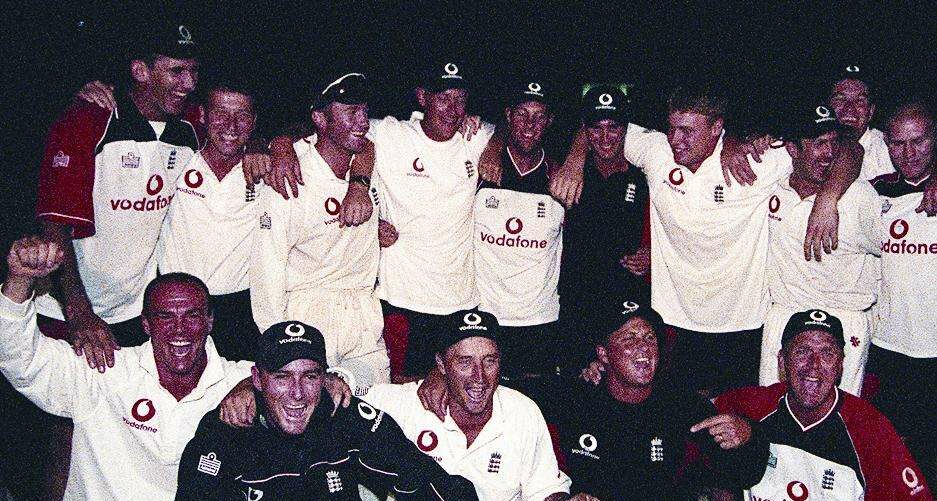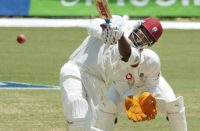Tim Wigmore reveals how England upset the odds in a stirring series win away to Pakistan in 2000…
As dusk engulfed Karachi at 5:52pm on a December night in 2000, euphoria engulfed the England cricket team. They had an unlikely triumph to toast, and none had done more to secure it than Graham Thorpe.
With fielders and spectators often unable to see the ball in the gloom – fielders frequently had no idea when it was coming towards them – Thorpe’s resolve remained unwavering. He underpinned England’s heist of 176 with 64 not out, putting on 91 with Graeme Hick, to seal a first series win in Pakistan for 39 years. Only in securing the triumph, with a Chinese cut past Moin Khan, did Thorpe briefly lose his sense of certainty at the crease.
“It was just in the nick of the time,” Thorpe says: victory was sealed about 45 minutes after play was normally suspended, but the umpires refused to give in to Pakistan’s blatant time-wasting tactics. “There were unusual circumstances – progressing into the last hour it was getting darker and darker. So it was quite a unique situation and probably a unique Test match to play in.”
In its own way this was a victory that should be cherished as much as any English win. Until venturing to Pakistan, England’s last trip to the Sub-continent had been in the early months of 1993, a sojourn that few other tours can rival for ignominy. England were whitewashed in the Test series against India, each defeat being even more emphatic than the last, and then lost the one-off Test in Sri Lanka to boot.
The terrible results were just the start: a Special General Meeting of the MCC was called to debate a motion of no confidence in England’s Test selectors; every member of the party went down with stomach problems at some stage; Indian Airlines even went on strike to complicate England’s travelling. England’s previous visit to Pakistan, in 1987, had been marked by defeat and Mike Gatting’s altercation with Shakoor Rana.
So, although England defeated the West Indies in the summer of 2000, they did not go to Pakistan burdened by expectation. But one year into the captain-coach alliance between Nasser Hussain and Duncan Fletcher, an experienced side – nine of the 11 that played all three Tests in Pakistan were in their 30s – had acquired an understated belief.
“Other people’s expectations weren’t great. We were reasonably confident – the group had been together a little while under Nasser and Duncan Fletcher so we were pretty clear in terms of how we wanted to approach it,” Thorpe recalls.
The challenge of facing a Pakistan attack that included Saqlain Mushtaq, who was rivalling Muttiah Muralitharan as the most lethal off-spinner in the world, as well as Wasim Akram and Waqar Younis, was a significant one.
“We went in with a mindset that we’d face reverse swing and a lot of spin. They’d be the main things that would undermine our batting,” Thorpe says.
So England needed a plan. Fletcher devised it: their preparation would not merely replicate the challenges of playing in Pakistan, but far surpass them. “It was almost extreme practice,” Thorpe says. “The games themselves were a lot more comfortable than our practice sessions.”
The crease in the nets was scuffed up, and sometimes batsmen were forced to face spin without pads to prevent them playing with their pads.
England also had the benefit of Fletcher’s expertise facing spin. The tour of Pakistan saw the birth of the forward press, the Fletcher technique of batsmen taking half a step forward onto the front foot as a spinner was about to deliver the ball.
“The forward press is being able to pick the length and the trajectory and use your feet, or be able to play very well off the back foot, which I used a lot more over there,” Thorpe explains. “Sometimes the spinners might bowl a little quicker over there if the pitches don’t turn as much in the first innings as the second. As a batsman you have to consider the tactics you use – it might be easier to come down the pitch in the first innings, but not so much the second. I used the sweep more in the second innings in Asia than in the first, when the ball might skid a little bit more.”
It was fitting that it was Thorpe who sealed England’s triumph. No one had done more to set it up. At Lahore in the first Test, Thorpe poked and prodded his way to a century that contained just a solitary boundary. While it took 196 overs for England to reach 480-8, the score on which they declared, Thorpe had made good on the side’s mantra to exploit good batting conditions in the first innings.
England’s tenacity at the crease, epitomised by Mike Atherton’s 129 in just shy of ten hours in the final Test, enabled them to stay in the series for the first 14 days. And when Ashley Giles located rough to turn the ball from outside Inzamam-ul-Haq’s off-stump to uproot that stump at the end of the penultimate day of the series, it provided Pakistan with an invitation to panic: they led by 88 runs with seven wickets in hand. Giles and Gough took three wickets apiece to leave England needing 176 in 44 overs to end Pakistan’s 34-Test unbeaten run at Karachi and seal the series.
“I look back on it as a great achievement by the team. We needed all the compartments to come together at the right time. We had two draws and we had to see games out to be able to draw them. We only had one opportunity to win the series, and that was in Karachi. When you get that chance you’ve got to be able to take it,” Thorpe says.
Now, as England’s lead batting coach, Thorpe believes that England could emulate the achievement of 15 years ago by defeating Pakistan in Asian conditions, albeit in the UAE.
“In the UAE for the first two to three days the pitches will be good and if you play well on them they’re good pitches to bat on so the key is having a really good method. A lot of the guys have played either Tests or Lions cricket in the Sub-continent so hopefully with those experiences, they’ll understand at least having a method. That’s the most important thing. Your shot selection and how you build your innings is still important, but they’re not going into conditions they’ve never seen before so that’ll be a big help.”
Should England need inspiration, they only need look at what Thorpe achieved in the winter of 2000/01. In hitting 553 runs at 61.44 apiece, Thorpe underpinned England’s Test victories in Pakistan and Sri Lanka, establishing himself as England’s finest and most adaptable batsman of his generation.
“I thoroughly enjoyed it. It was great fun performing in different conditions – doing that is what a lot of players want to be able to prove. It is challenging, no doubt about it – it’s why, when you go through England’s record, you don’t see heaps of series wins in the Sub-continent. But, if you can achieve it, it’s one of the most satisfying things.”
This piece originally featured in The Cricket Paper on Friday October 2, 2015















